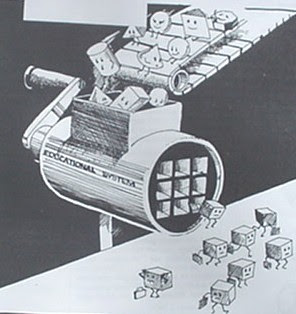 The age of mass education, one size fits all, is coming to and end - but far too slowly!!
The age of mass education, one size fits all, is coming to and end - but far too slowly!!Many of the signposts to make more learners successful are evident today, say the guardians of the Secondary Future group, in their report on students.
'Shaping secondary schooling may not so much as a leap into the unknown as ensuring today's indicators and successes are better understood and more widely distributed'.
You have to wonder what stops these ideas from reaching fertile ground?
Currently the National Certificate of Achievement ( NCEA) gives schools the flexibility to design more relevant personalised learning for their students but it seems senior traditional principal spend more time running NCEA down, hankering for the good old days of pass/fail examinations. Accusations of dumbing down need to be replaced by schools creating learning environments to encourage students to do their best by engaging them on tasks that interests them.
Seems pretty obvious, but schools are either not truly 'learning organisations' or they are extremely 'slow learners!
The report says schools are moving towards a, 'students first' approach by allowing students more control over what is learned, how it is learned, and when it is learned, by making use of, what is called, a 'co-constructivist approach'. Such an approach actively involves students in their own learning, values their questions, their 'prior' ideas, and ideas about how to solve problems. The teacher's role is more of a 'learning adviser', or a 'learning coach', than a 'teller'. This could lead to each student negotiating their own Individual Learning Plan ( IEP) - a process more currently limited to special needs students.
Students in the future, the report continues, will need help to screen out unhelpful data and to develop the capacity to process information. A good outcome of schooling, it says, is one where all students leave school with a positive learning identity, self confidence, and the necessary skills to live, work, and proper. This is to include an ecological sense of sustainability, and an appreciation of the heritage and cultures of New Zealand. Students who have the capacity to not only value self but also the common good and welfare of others.
All far to important to wait for 20 years to realize!
Four trajectories have been identified by the report:
Customised learning pathways involving dialogue between students and the parents so students feel the motivation of ownership. This directly in conflict , 'in schools where custody is perceived as a major role, students seen as unquestioning detainees... and where parents are seen as obstacles to progress.' This trajectory would require developing unique student pathways; Individual Learning Plans (IEPs), 'that build on individual interests and enthusiasm'. This is the 'personalisation of learning agenda' we hear so much about.
Linked up Learning Programmes. This requires students being able to access a range of learning programmes that could occur in more than one centre, other schools, and distance leaning through on line learning.
Multiple Learning Portals. Traditional 'face to face learning' will be complemented, even replaced, by a wide and growing range of opportunities. Schools will need to assess the quality of such learning and to guide students, and help them use it, to serve their particular needs.
Synchronised Learning Platforms. Required to develop synergies and communication between neighbourhoods, communities of interests, social services, ethnic collectives and the eduction system. Links between levels of schools also needs to be strengthened. Such ideas are a real challenge for a schools that originally developed to serve, an increasingly out of date, industrial era. Our current schools have developed independent of each other, school that cater for different age groups, with little inter-school interaction, to the detriment of the learners.
All the above will requires a considerable paradigm shift - a new way of looking at the role of teachers and schools in respect to how they serve 'their' students. Such thinking requires an attitudinal shift from the current conformity of our secondary schools.
To achieve these pathways the report suggests:
School leaders taking up the challenge to think and act differently.
More discussion with students and families about each students learning goals.
The emergence of mentoring systems for all students and teachers
More diverse learning programmes, times and sites
Stronger links between students and their families, community organisations, businesses and public services.
All seems simple enough to me - the 'blocks' to such change lies 'between the ears' of those who lead and teach in our secondary schools and the lack of imagination and courage of our our politicians.
Not so simple after all.
3 comments:
I can't see many secondary teachers, I know, taking much notice of such ideas. They have a long history of ignoring ideas that challenge their traditional power and expertise!
The picture says more than 1000 words!
The trouble with secondary teachers is that too many intelligent teachers think the same and then reinforce each others sense of what can be done - creating self satisfaction, complacency and conformity in the process. Those who think differently are hidden in the art room! A 'Bay of Pigs' group think problem.
Post a Comment